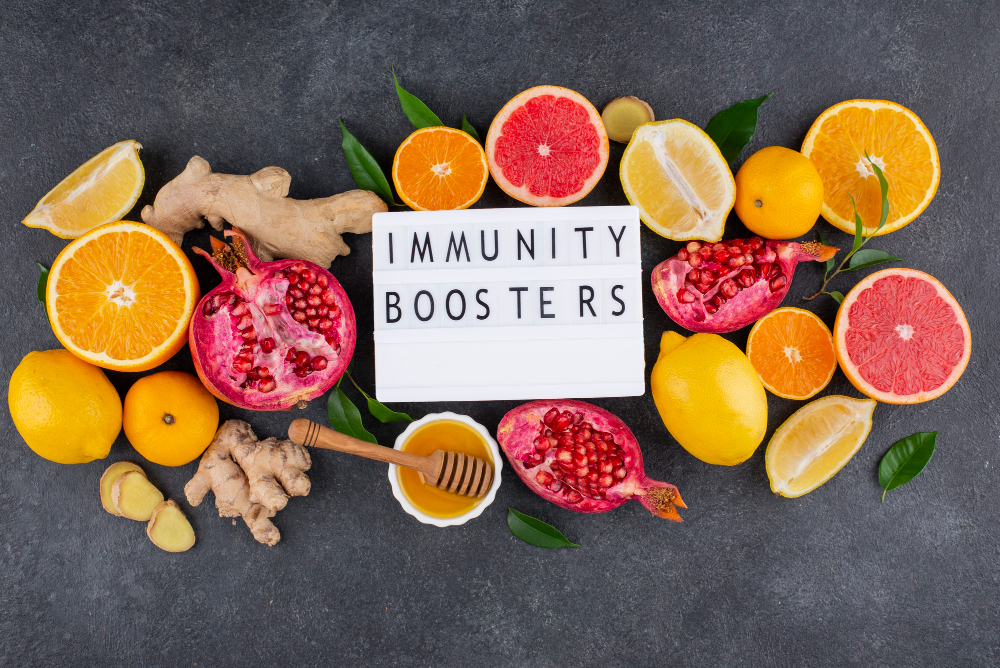Introduction to Immune System and Vitamins
The immune system is our body's defense against pathogens, and vitamins play a crucial role in supporting its function, highlighting 5 Vitamins That Are Best for Boosting Your Immunity. Let's explore how various vitamins and nutrients can naturally strengthen our immune system.
Vitamin C: The Immunity Powerhouse
Vitamin C is renowned for its immune-boosting properties, aiding in the production of white blood cells and antibodies. Citrus fruits, strawberries, bell peppers, and broccoli are excellent sources.
Vitamin D: Sunshine for Immune Health
Known as the sunshine vitamin, vitamin D plays a key role in immune function and can be obtained from sunlight, fortified foods, and supplements, especially important for those with limited sun exposure.
Vitamin E: Antioxidant Defense
Vitamin E acts as an antioxidant, protecting cells from damage and supporting immune function. Nuts, seeds, spinach, and fortified cereals are rich sources.
Vitamin A: Enhancing Immune Responses
Vitamin A is crucial for maintaining healthy immune cells and mucous membranes. Carrots, sweet potatoes, leafy greens, and liver are good sources, but excessive intake should be avoided.
Vitamin B6: Immune Regulation
Vitamin B6 is involved in immune cell communication and function. Include bananas, chicken, fish, and chickpeas in your diet for adequate B6 levels.
Zinc: Essential Mineral for Immunity
Zinc plays a vital role in immune cell development and function. Oysters, beef, poultry, legumes, and nuts are zinc-rich foods beneficial for immune health.
Selenium: Antioxidant Support
Selenium acts as an antioxidant and supports immune responses. Brazil nuts, fish, poultry, and whole grains are good selenium sources.
Iron: Immune Function and Hemoglobin
Iron is essential for immune cell growth and hemoglobin production. Incorporate lean meats, beans, spinach, and fortified cereals to maintain optimal iron levels.
Omega-3 Fatty Acids: Inflammation Control
Omega-3s help reduce inflammation, benefiting immune function. Include fatty fish like salmon, flaxseeds, chia seeds, and walnuts in your diet.
Probiotics: Gut Health and Immunity
Probiotics promote a healthy gut microbiome, supporting immune function. Yogurt, kefir, sauerkraut, and kimchi are probiotic-rich foods.
Herbal Supplements: Natural Immune Boosters
Herbs like echinacea, elderberry, garlic, and ginger have immune-boosting properties. Use them judiciously as supplements or in culinary preparations.
Balanced Diet for Immune Support
A diverse and balanced diet rich in fruits, vegetables, whole grains, lean proteins, and healthy fats provides essential nutrients for immune health.
Lifestyle Factors and Immune Health
Regular exercise, sufficient sleep, stress management techniques like meditation or yoga, and avoiding smoking contribute to overall immune resilience.
Conclusion
By incorporating a variety of immune-boosting vitamins, minerals, and nutrients into your diet, along with healthy lifestyle practices, you can naturally enhance your immune system's strength and resilience against infections and illnesses.
Unique FAQs
Can vitamin supplements replace a healthy diet for immune support?
While supplements can fill nutrient gaps, they should complement, not replace, a balanced diet rich in whole foods for comprehensive immune support.
Are there specific vitamins or nutrients that help with seasonal allergies?
Certain vitamins like vitamin C, quercetin (found in onions, apples), and omega-3 fatty acids may help alleviate allergy symptoms by modulating immune responses and reducing inflammation.
Can excessive intake of vitamins or minerals harm the immune system?
Yes, consuming vitamins or minerals in excessive amounts can have adverse effects on health and immune function. Follow recommended daily allowances or consult a healthcare professional for guidance.
Do cooking methods affect the vitamin content of foods?
Yes, prolonged cooking or high heat can lead to vitamin loss in foods, especially water-soluble vitamins like vitamin C and B-complex vitamins. Opt for steaming, microwaving, or minimal cooking to preserve nutrient content.
How long does it take for dietary changes to positively impact immune function?
Positive changes in diet and lifestyle can impact immune function gradually over weeks to months, emphasizing the importance of consistency and long-term habits.





Comments